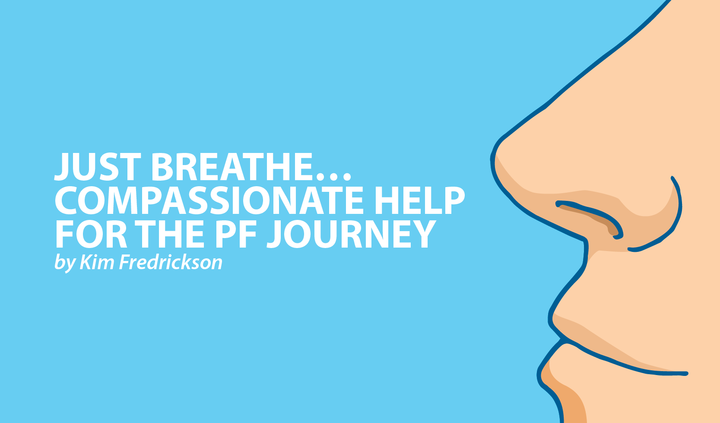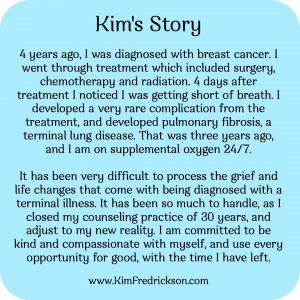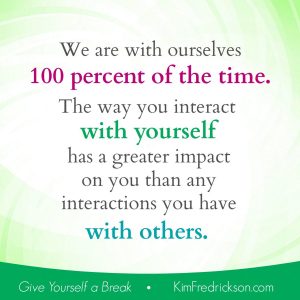Turning to Self-Compassion in Difficult Times


Two weeks ago, I had the joy of sharing my recent trip to our son’s wedding, which was made possible by the generosity of others. During my trip to Houston, I met with a friend of mine who is also a counselor, Jennifer Christian. She interviewed  me for her podcast about being compassionate with ourselves as we go through difficult times. As pulmonary fibrosis patients, we sure know about going through tough times!
me for her podcast about being compassionate with ourselves as we go through difficult times. As pulmonary fibrosis patients, we sure know about going through tough times!
Jennifer asked me to share how I developed PF and how my life has changed, and about my commitment to being a good friend to myself as I walk this difficult journey. You can listen to part one of the podcast here.
Learning about self-compassion
I first learned about the importance of self-compassion in my work counseling clients for 30 years. They were brave and courageous as they worked through current or past experiences that were painful.
Part of their growth was learning to be compassionate with themselves, as they worked through past or current issues. What they went through damaged their relationship with themselves. They believed negative messages about themselves and didn’t know how to care for or be kind to themselves.
I found that as my clients practiced self-compassion, they got better faster. Their growth lasted after they stopped counseling because they had a good friend on the inside to walk through life with.
Even when things are really hard, you can still be a friend to yourself. After I got the call from the doctor that I had breast cancer, I cried for a while, prayed, and said out loud, “I’m going to be a good friend to myself through this process.” When I got the news I had PF, I knew I needed to treat myself with care and compassion on this unwanted journey.
Accepting help
I decided that when others offered help, I would accept it. I said “yes” when people offered to bring meals, drive me to chemotherapy, or do errands for me. It’s tough to accept help sometimes. We may feel ashamed or blame ourselves for what we are going through, even if there is no reason to feel that way. We may be used to helping others, but not used to accepting help for ourselves.
Difficulty applying self-compassion
Some of my clients felt they couldn’t be compassionate with themselves because what they were going through was partly their fault, even if this was untrue. The reality is that we’re human.
It doesn’t matter if we’re not perfect, are having trouble adjusting to our diagnosis, or struggle to keep going. No matter what, we deserve kindness, compassion, grace, and understanding. No one gets through life without struggling or making mistakes. We are human, and learning as we go is a part of life.
Every new challenge results in a learning curve, whether it is being diagnosed with PF, having financial difficulties, dealing with a child who is struggling, or helping a parent with Alzheimer’s. Each challenge is new to us, and we shouldn’t expect ourselves to know how to do things we’ve never done before.
When we are hard on ourselves for being imperfect human beings, we then have two problems: the original one we started with and blaming ourselves for not knowing how to handle it.
Words of self-compassion
Here’s what I might say to myself if I notice I’m being hard on myself:
“I’m not bad for struggling. It feels like I should have done something differently. Maybe so, but probably not. I’m grieving after having such a terrible diagnosis and doing the best I can. There is so much to handle with tests, doctor visits, and getting used to oxygen and medications. I’m not wrong for struggling with a difficult situation. Anyone would. I can be kind to myself and get the help and support I need to get through this.”
 For me, practicing self-compassion has really helped me negotiate this very difficult journey. I’m with myself 100% of the time. The impact of my own words, as well as the way I care for myself, is far more influential than what anyone else does or says, This is because I’m with myself all of the time.
For me, practicing self-compassion has really helped me negotiate this very difficult journey. I’m with myself 100% of the time. The impact of my own words, as well as the way I care for myself, is far more influential than what anyone else does or says, This is because I’m with myself all of the time.
Toward the end of the podcast, I share about how blessed I am to write this column, and how wonderful it is to see all of us supporting one another. During really difficult times like these, we need one another, as well as a compassionate relationship with ourselves. Click here if you’d like some help building a compassionate relationship with yourself.
I’d love to hear from you. What made sense or stood out to you? Do you have difficulty being compassionate with yourself? If so, when is it the hardest? What are ways you’ve been a good friend to yourself as a PF patient or caregiver?
Next week I’ll be sharing part two of this podcast with a special section for family and caregivers.
Please share this post with anyone you feel could benefit, or on social media. We’re in this together.
***
Note: Pulmonary Fibrosis News is strictly a news and information website about the disease. It does not provide medical advice, diagnosis, or treatment. This content is not intended to be a substitute for professional medical advice, diagnosis, or treatment. Always seek the advice of your physician or other qualified health provider with any questions you may have regarding a medical condition. Never disregard professional medical advice or delay in seeking it because of something you have read on this website. The opinions expressed in this column are not those of Pulmonary Fibrosis News, or its parent company, Bionews Services, and are intended to spark discussion about issues pertaining to pulmonary fibrosis.
Save








Leave a comment
Fill in the required fields to post. Your email address will not be published.